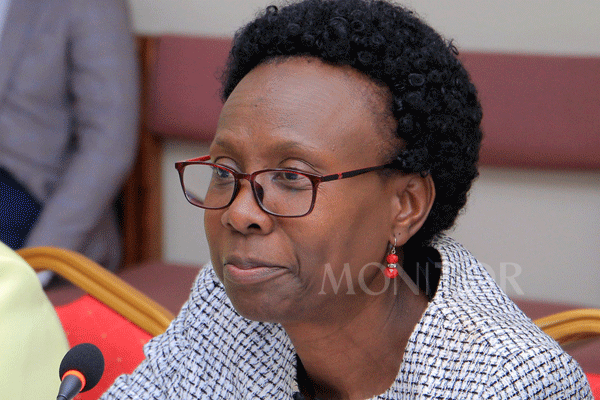Prime
Now that the economy is reopened, what next?

Businesses in Kampala. Investors make decisions based on the rate of return they expect to receive. PHOTO | MICHAEL KAKUMIRIZI
What you need to know:
- As Uganda lays out strategies for economic recovery and growth following the negative impact of the Covid-19 pandemic on Uganda’s economy, the permanent secretary and secretary to treasury, Mr Ramathan Ggoobi speaking about the government’s economic recovery and growth strategies recently said there are three- objective strategies to accelerate recovery and growth, Martin Luther Oketch writes.
Economic growth is the most powerful instrument for reducing poverty and improving the quality of life in developing countries. Growth can generate virtuous circles of prosperity and opportunity in the country.
Economic growth generates job opportunities and stronger demand for labour thus increasing employment which has been crucial in delivering higher growth in other countries.
Alongside the stable and higher economic growth is macroeconomic stability. Investors make decisions based on the rate of return they expect to receive and the riskiness of the investment project: the higher the risk, the higher the required rate of return.
As Uganda lays out strategies for economic recovery and growth following the negative impact of the Covid-19 pandemic on Uganda’s economy, the permanent secretary and secretary to treasury, Mr Ramathan Ggoobi speaking about the government’s economic recovery and growth strategies recently said there are three- objective strategies to accelerate recovery and growth.
“During the next Financial Year 2022/23 and over the medium term, our economic policy will seek to achieve the following three broad objectives: Mitigation of the Covid-19 impact on business activity and livelihoods through wide spread vaccination to fully reopen the economy; and financial support to business,” he said.
Mr Goobi added: “Speeding up socioeconomic transformation through re-prioritisation of the national budget to redirect resources towards wealth and job creation, industrialisation, export promotion and other areas with high return on investment; and sustaining national security and macroeconomic stability as key foundations for recovery, growth and transformation.”
Spending reviews have increasingly attracted attention in the country and among the development partner community. They are at the core of fundamental questions as regards the use of public resources, such as: is spending allocation done in the most efficient and effective way? Is it aligned with current priorities? By offering a better understanding on how public resources are and should be spent, spending reviews help governments deal with a number of issues.
Where exactly is the government going to invest more during this recovery time?
Mr Ggoobi said vaccination of all Ugandans to support efforts to re-open the economy and stay open, stimulus packages and payment of domestic arrears to boost aggregate demand and support businesses to restart, agro-industrialisation, light manufacturing and industrial park infrastructure, Covid-19 emerging investment opportunities for export promotion and import substitution; digitalisation and scientific innovations including protection of intellectual property.
The other investments that Mr Ggoobi stated are: market entry in UAE, EU and AfCFTA; continued infrastructure development-especially road maintenance, energy reliability and affordability; railway rehabilitation; and urban transport; commercialisation of oil and gas (finalisation of FID to attract FID) mineral beneficiation.
Restoration of tourism and hospitality sector, rebranding Uganda to get here more than just tourists; deepening financial inclusion –implementing the Parish Development Model to support the 39 percent of Uganda households still in subsistence to join the monetised economy, SACCOs, Emyooga, SME recovery Fund UDB/UDC, and investment in a national payment switch; and public sector reforms to achieve efficiency and effectiveness including rationalisation of government through e-GoU particularly e-procurement and e-education.
Financing
Tackling the question of financing strategy: where will the money come from to fund these interventions?
“First, as a country we are going to learn to live within our means. We’re going to stop budgeting incrementally. Winners are going to gain by taking from losers rather than claiming incremental resources. We are going to make the budget redistributive. We must promise in the plans what we can pay for in the budget,” he pledged.
Adding: “We are going to make the budget less accommodative. We are going to restore fiscal discipline. The tendency to presume that spending must be higher next year than before must stop!”
This is was the most eminent and candid pronouncements the new PSST who is now about six months in office has made. He faces high expectations of fixing the economy where all manner of policy experimentations happened and did not deliver the desired expectations.
The national budget is the single most important policy vehicle for giving effect to a country’s economic and social priorities within the scarce resources that are available to the government for the public expenditure. It is through the budget process that competing policy objectives are reconciled and implemented in concrete terms. Year in, year out the government has executed supplementary budgets.
However, Mr Ggoobi said supplementary budgets will be only for emergencies and unforeseen expenditures.
“Like elsewhere, we are facing revenue shortfalls and tightening room for borrowing. Therefore, the most pragmatic way out is to increase allocative and technical efficiency. This calls for strict adherence to agreed priorities by both the bureaucrats in MDA and politicians,” he proposed.
Tourism pre-pandemic positioned itself as the best forex earner for the country organically but this was almost all wiped out when Covid-19 arrived with its lock downs. In the global and the national economy, tourism is one of the most noticeable and growing sectors. This sector plays an important role in boosting a nation’s economy. An increase in tourism flow can bring positive economic outcomes to the nations, especially in gross domestic product (GDP) and employment opportunities.
The deputy executive director of Uganda Tourism (UTB), Mr Bradford Ochieng, said before the Covid-19 pandemic Uganda received over 1.5 million visitors with the December month being the most active bringing in $140 million and in total the country received $1.6 billion, but since the outbreak of the Covid-19 pandemic that dropped to $500 million.
Going forward, Mr Ochieng said: “If we are in the tourism sector, domestic tourism is the way to go, let us travel domestically, that is the way we can bring recovery in the tourism sector faster,” he said.
“We need to diversify to have more leisure visitors in the country,” Mr Ochieng added.
The rate of occupancy in Uganda’s hotels and other tourist establishments dropped to 5 percent, but it has recovered to 31 percent which is still below the usual level of 68 percent. It remains critical to get the tourism sector back on its growth trajectory because at its peak in 2019, the Shs1.6 billion in earnings were expected to grow. It appears at least for now , that is the number to aim for before any further growth is expected.
Beside the tourism sector, the education sector in Uganda was equally hit by the Covid-19 pandemic causing the learners to stay out of schools for two years, hence affecting Uganda’s human capital development.
The team leader of Abacus school, Professor Samuel Sejjaaka said reopening of economy is a good thing but does not mean business as usual because a lot of things have changed.
“Parents will be pressured to get the children back to school, a half a million girls are not going back to schools because of pregnancy, the loans that schools have borrowed will continue to stand because the banks are not going to let it go, their work is to borrow and have loans get paid back,” he said.
Professor Sejjaaka said moratoriums that have been in place in the supervised financial institutions are never normally loan principles so the borrowers have got to pay back. The decision by the Banks to write off the 2021 interest accrued by the schools in the range of between Shs400billion and Shs500billion is a welcome step.
He said the service providers to education institutions have been affected by the closure of schools . When the schools and tertiary institutions open their services will still be needed but it will require new contracts.
The managing director of dfcu bank who is also the chairman Uganda Bankers’ Association, Mr Mathias Katamba pointed to a cautiously upbeat near future which will not see lending rates drop too much as a safety for the financial institutions which might experience the lag effect of the relief measures granted by the Bank of Uganda in growth of non performing loans which are at 5.4 percent in December, up from 4.8 percent.
As doubts lingered on paying back the borrowed loans due to difficult business conditions, Mr Katamba cautions: “The businesses failure to pay back the loans have effects on bank balance sheets.”
Signaling out the compliance by the banks and the Credit Relief Measures that had been instituted by the central bank, Mr Katamba said it helped to keep liquidity in the banks. “We need businesses to be more prudent in 2022. Banks are ready to support businesses and the banks are in strong position,” Mr Katamba said.
Mr Katamba said as banks embrace technology in service provision the investment in technology has gone up and cyber security has risen. So the direction to reduce in-person bank customer interface will evidently continue on the back of its being accelerated by the pandemic.
The digitalisation agenda of the economy is both a public and private sector concern and as led by the financial sector, there seems to be no return. But key ingredients of this push forward will have to be looked at even as government opens up the economy.
Former agriculture minister Ms. Victoria Sekitoleko believes the internat is central, “If you digitalise the economy you would be saving a lot of money. However, the cost of the Internet is high, it must be looked into.” At the outset of the second wave of the Covid-19 pandemic, the 12 percent tax on data was imposed by government. Officially however, it is not clear if users are paying it or the telecoms have seen to it as they made claim in July 2021. One of the least mentioned areas of the economy that will come to almost the center is logistics, which is the enabler of the entire supply chain of exports and imports.
The MD of DHL Uganda, Mr Abubaka Mayanja, said both regionally and nationally output was lost and the supply chain has been greatly affected during this time of Covid-19 pandemic.
“The cost of shipping from China to Uganda used to be $2,000 per container but this has increased to $10,000 or $12,000.”
Mr Mayanja illustrated the impact of the disruption saying if a tablet requires eight inputs and just two cannot be delivered because containers are not available or because a Chinese port is working half capacity because of Covid, that factory cannot make that drug.
Not business as usual
The team leader of Abacus school, Professor Samuel Sejjaaka said reopening of economy is a good thing but does not mean business as usual because a lot of things have changed.
“The parents are going to be pressured to get the children back to school, a half a million girls are not going back to schools because of pregnancy, the loans that schools have borrowed will continue to stand because the banks are not going to let it go, their work is to borrow and have loans get paid back,” he said.




